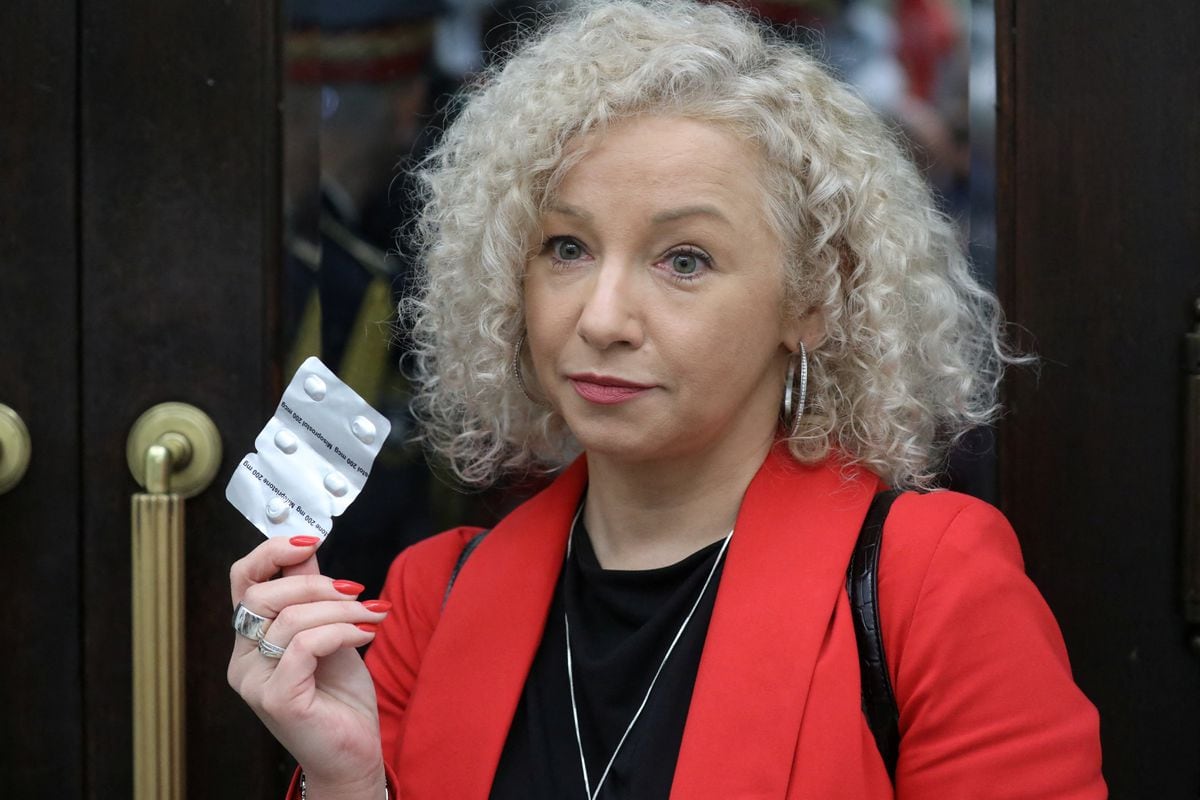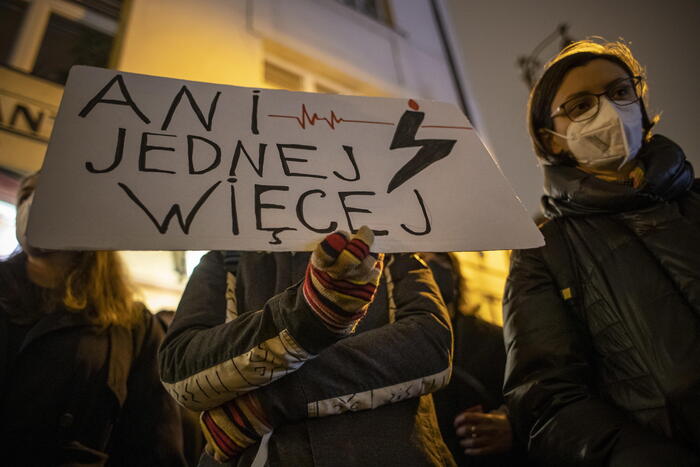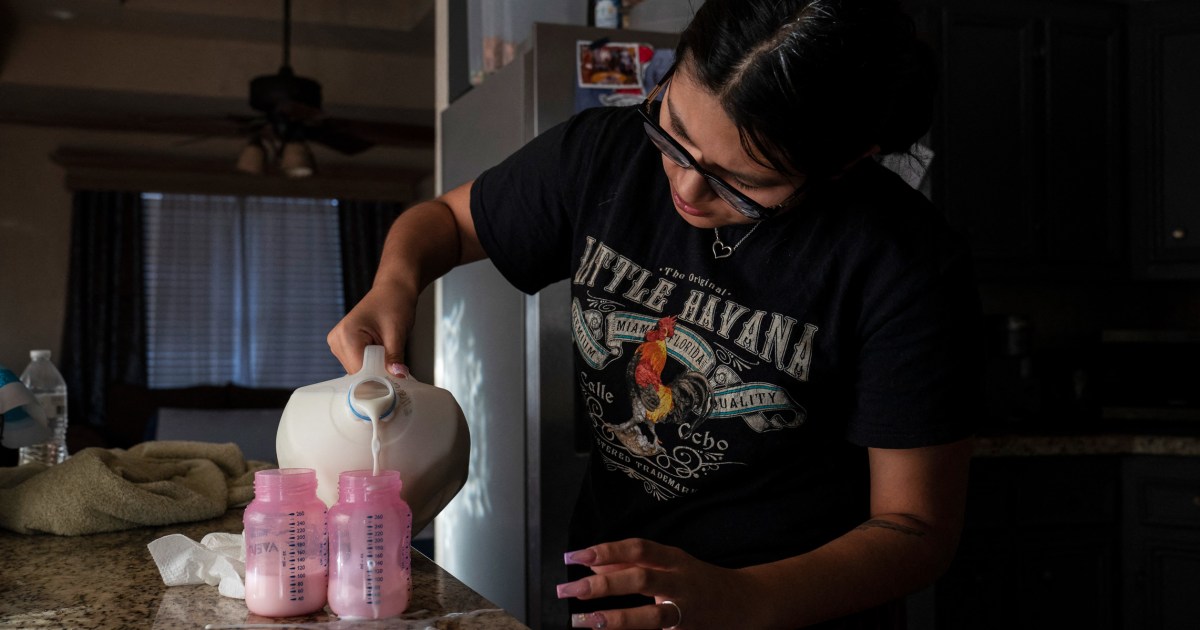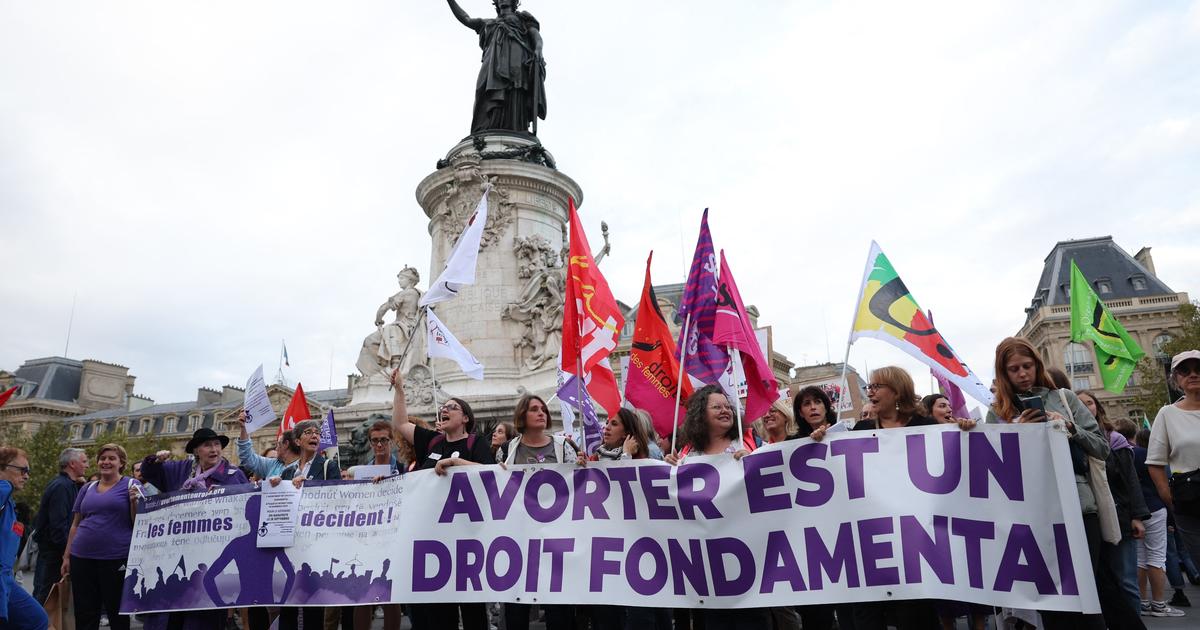Icon: enlarge
Olga Madurska in her Warsaw apartment: "No woman is prepared to end her first pregnancy with a pill"
Photo:
Piotr Malecki / DER SPIEGEL
Olga Madurska did not give birth to two children that year.
She speaks her story into a microphone in Warsaw last Saturday.
The story of a woman who was twice pregnant and yet had no child alive in a country that made her a criminal because of it.
When Madurska speaks publicly about her experiences and many stop and listen to her, thousands are again on the streets in Poland's capital;
They block traffic in the center of the city, they protest against the decision of the Polish Constitutional Court, which makes legal abortion almost impossible in the country.
Olga Madurska is standing in the middle of a roundabout,
a flower box is her pedestal, she wears black, has painted a red lightning bolt across her cheek, the symbol of the revolt of an entire Polish generation.
She says this sentence: "Yes, I had an abortion."
Later, on the phone, Madurska, 29, tells her story all over again.
It starts with a package that was in Madurska's mailbox in April 2020.
Inside are five pills sent by a Polish organization that helps women get an abortion when the law doesn't allow them to.
Icon: enlarge
Madurska terminated a pregnancy on medication in April
Photo: Piotr Malecki / DER SPIEGEL
“I was all alone when I took the first pill.
I swallowed it and stayed in bed all day.
I was devastated, this situation made me sick.
I waited 24 hours.
You have to wait that long before you take the remaining four pills. "
There is one sign that drug abortion worked, and that sign is blood.
After the five tablets, Madurska waits for the moment when her bleeding begins.
She says she woke up at six the next morning, doing the laundry, cleaning the kitchen, and going to the bathroom every few minutes, "but there wasn't any bleeding," she says.
That she then went to her parents' house to distract herself.
But that the thought kept coming up in her: What if the bleeding doesn't come?
What if the abortion didn't work?
You have to know that at the time when she became pregnant, Olga Madurska was taking a drug for her acne, it is called Izotek.
The active ingredient, isotretinoin, can inhibit the effect of the birth control pill and lead to severe malformations in unborn babies.
Icon: enlarge
When she became pregnant, Madurska took heavy drugs that can harm unborn babies
Photo: Piotr Malecki / DER SPIEGEL
Ultrasound examinations from the 12th week of pregnancy can give women clues as to whether and to what extent the fetus in their belly is damaged.
However, women's organizations in Poland criticize the fact that doctors often do not inform pregnant women there about this possibility.
And even if severe or incurable damage is found: According to the Constitutional Court, abortions are only possible after rape, or if the mother's life is endangered by the pregnancy.
The court, dominated by the national conservative government, tightened abortion law in October.
Abortions are now practically completely prohibited.
Even in a case like that of Madurska.
That evening, Olga Madurska's blood came like a release.
“I wasn't afraid of having an abortion.
I was afraid that the government would force me to give birth to this child.
I was so scared of having this child whose body might have been so badly damaged. "
She says, “No woman is prepared to end her first pregnancy with a pill.
But I knew I had done the right thing. "
Abortion routes still exist in Warsaw, where Madurska lives.
There are pharmacies that sell appropriate tablets to women.
Organizations there and in other cities advise women if they want to have an abortion with medication at home or through an operation abroad.
In Germany, for example, the Czech Republic and Slovakia.
An estimated 80,000 to 150,000 Polish women have abortions per year.
Icon: enlarge
Zuzia Smoczyńska also drove.
Her ex-boyfriend called her a murderer
Photo:
Piotr Malecki / DER SPIEGEL
Madurska says that it was not difficult for her to find the relevant Internet pages on which the information is hidden.
You know people who know about it.
You know where to look.
You have enough money.
But she cannot imagine what it is like to live in the country in Poland, in a conservative environment, with little money and less freedom.
She believes that many women are all alone and in need there, and that they end up having children that they did not want to have for good reasons.
Basically, it doesn't matter whether a woman lives in the city or in the village.
The laws force women all over Poland to go underground and look for a drug like a rifle gun.
The images of the massive protests against the PiS government, with hundreds of thousands of demonstrators, can easily hide this: But society in Poland is deeply divided into liberals and Catholic traditionalists who support the government's course.
There has already been talk of civil war and a society that is falling apart.
Icon: enlarge
Legal abortion is in fact no longer possible in Poland.
Zuzia Smoczyńska looked for help on the Internet and found it
Photo: Piotr Malecki / DER SPIEGEL
With Zuzia Smoczyńska the split went through her own relationship.
When she accidentally became pregnant a few years ago, she was 21 years old, she was studying anthropology in Warsaw, and she had only been together with her boyfriend for a few weeks.
He comes from an arch-Catholic family.
When she takes the pregnancy test and it turns out positive, when panic spreads in Smoczyńska and she makes the decision not to have the baby, she leaves her boyfriend outside.
While she's sure that her boyfriend doesn't want to be a father, she knows his answer to an abortion, and that answer would be a no.
"So I went through it alone," says Smoczyńska.
She also looked for help on a website.
Read the reports from women in the Q&A section.
Ordered the pills.
She gave her parents' apartment, who were on vacation, as the delivery address.
When she took the pills out of the pack and swallowed, she was very calm.
“I told him to look me in the eye when he calls me a murderer.
But he couldn't look me in the eye. "
Zuzia Smoczyńska, 28 years old, from Warsaw
It took Smoczyńska a year to tell her boyfriend about the abortion.
They argued.
He said she was a murderer.
Smoczyńska says: “I told him to look me in the eye when he calls me a murderer.
But he couldn't look me in the eye. ”She says they never talked about it again.
Shortly afterwards, the relationship broke up.
It was a big mistake not to have used prevention.
For her, however, taking responsibility for this mistake meant not having the child.
Then Smoczyńska says a sentence that needs to be thought about a bit.
She says she is annoyed that so many people are hiding behind an ideology in order not to have to take on this responsibility.
In November the EU Parliament passed a resolution against Poland, calling for the right to have an abortion.
"We have to discuss abortion in Europe in 2020 because fundamentalist Christians are supposedly defending the right to life," said Swedish MP Helene Fritzon.
And her Polish colleague Sylwia Struwa said: "Every year in Poland we move further away from Paris, Berlin or Rome."
Icon: enlarge
"They are only interested in the fact that we are bringing in more babies, more, more," says Olga Madurska about the Polish government
Photo: Piotr Malecki / DER SPIEGEL
Olga Madurska got pregnant again two months after her termination this June.
She had stopped taking acne pills.
She was prepared.
She wanted this child.
In the tenth week of pregnancy, a doctor in the hospital told her that her unborn child was no longer alive.
"That was it, that's all he had to say," says Madurska.
There was no good word, no psychological help.
Just that feeling again:
She was alone this time too.
Madurska says that at that time she was suddenly very sure.
That there are exactly nine months in the life of a woman that counted for the Polish government.
The months in which she is expecting a child.
"They only care that we get more babies, more, more," she says.
The system is not interested in the life of a woman, whatever her situation, in the years before and in the years after.
Icon: The mirror
This contribution is part of the Global Society project
What is the Global Society project? Up arrow Down arrow
Under the title Global Society, reporters from
Asia, Africa, Latin America and Europe
report on injustices in a globalized world, socio-political challenges and sustainable development.
The reports, analyzes, photo series, videos and podcasts appear in the international section of SPIEGEL.
The project is long-term and will be supported by the Bill & Melinda Gates Foundation (BMGF) for three years.
A detailed FAQ with questions and answers about the project can be found here.
What does the funding look like in concrete terms? Up arrow Down arrow
The Bill & Melinda Gates Foundation (BMGF) is supporting the project for three years with a total of around 2.3 million euros.
Is the journalistic content independent of the foundation? Up arrow Down arrow
Yes.
The editorial content is created without any influence from the Gates Foundation.
Do other media have similar projects? Up arrow Down arrow
Yes.
Big European media like "The Guardian" and "El País" have set up similar sections on their news sites with "Global Development" and "Planeta Futuro" with the support of the Gates Foundation.
Have there already been similar projects at SPIEGEL? Up arrow Down arrow
In recent years, SPIEGEL has already implemented two projects with the European Journalism Center (EJC) and the support of the Bill & Melinda Gates Foundation: The "Expedition The Day After Tomorrow" on global sustainability goals and the journalistic refugee project "The New Arrivals", as part of this several award-winning multimedia reports on the topics of migration and flight have emerged.
Where can I find all publications on Global Society? Up arrow Down arrow
The pieces can be found at SPIEGEL on the topic Global Society.









